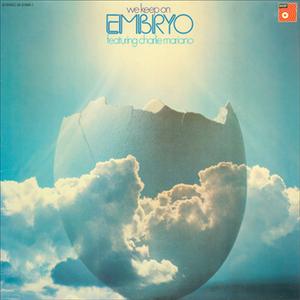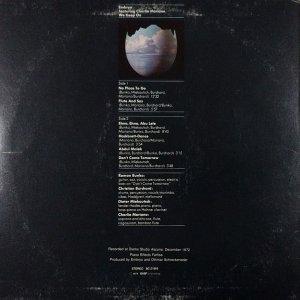We Keep On
by Embryo


Artist:
Embryo Featuring Charlie Mariano
Label:
BASF
Catalog#:
BC 21865
Format:
Vinyl
Country:
United States
Released:
1973
| Tracklist | |||
| A1 | No Place To Go | 12:32 | |
| A2 | Flute And Saz | 5:57 | |
| B1 | Ehna, Ehna, Abu Lele | 8:43 | |
| B2 | Hackbrett-Dance | 3:54 | |
| B3 | Abdul Malek | 3:15 | |
| B4 | Don't Come Tomorrow | 3:48 | |
| Notes: |
Bass - Roman Bunka |
||
Credits
Drums, Percussion, Vocals, Marimba, Vibraphone [Vibes], Dulcimer [Hackbrett], Mellotron - Christian Burchard
Electric Piano [Fender Rhodes], Piano - Dieter Miekautsch
Guitar, Baglama [Saz], Vocals, Percussion - Roman Bunka
Other [Supervision] - Pere Soley
Producer - Embryo
Producer - Othmar Schreckeneder
Reissue Producer - Jordi Soley
Saxophone [Soprano And Alto], Flute, Wind [Nagasuram], Flute [Bamboo] - Charlie Mariano
Notes
Recorded at Dierks Studio, Ascona, Italy, December 1972.
Strawberry Bricks Entry:
Munich was an especially fertile breeding ground for rock music in the late 60s, perhaps because of its reputation as a jazz center in Europe; also, groups as diverse as Amon Düül I & II, Popol Vuh, Passport and Embryo all called it home. Percussionist Christian Burchard founded Embryo in late 1969, following a brief stint in Amon Düül II. After releasing their debut album Opal on Ohr, the group essentially solidified with drummer/vocalist Burchard, bassist Roman Bunka, flautist Hansi Fischer and saxophonist/violinist Edgar Hofmann. Signed to United Artists, the band released a couple more albums before the label dropped them for not being commercial enough; recordings made in the interim were subsequently released by the more liberal-minded Brain label. These albums featured American pianist Mal Waldron as a guest; he originally worked with Burchard in the late 60s. In late 1972, Embryo hooked up with another iconic jazz musician, American saxophonist Charlie Mariano. Signed to BASF, Embryo was now a quartet, comprised of Burchard, Bunka, Mariano and keyboardist Dieter Miekautsch from Missus Beastly, another Munich jazz-rock outfit. Their first issue on the label, We Keep On, is one of the most inspired fusion albums of the era. The record kicks off with the electrifying groove of "No Place to Go." Under the rhythm of Miekautsch's crisp electric piano and Burchard's persistent drumming, both Mariano and Bunka let loose on their respective instruments; it's got a krautrock vibe, with an intensity that's heavier than any contemporary fusion. "Flute and Saz" is exactly that, featuring the lute-like instrument from Turkey. "Ehna, Ehna, Abu Lele" again goes for intense fusion, but this time with far more ethnic flavoring in the beat; while "Hackbrett-Dance" features Mariano on nagaswaram, an oboe-like instrument from India. The final two tracks, "Abdul Malek" and "Don't Come Tomorrow," recall Can, which was probably a coincidence. The collaboration with Mariano brought considerable attention to the band; the album was even billed as "featuring Charlie Mariano" and saw a US release in 1974. Embryo would release another album for BASF before Burchard co-founded April/Schneeball Records in 1976 with Ton Steine Scherben, Sparifankal and Missus Beastly. His interest in ethnic music would lead him to extended sabbaticals throughout the world, including India, Nigeria and Japan; and with constantly fluid lineups, Embryo also moved toward a worldlier fusion of sound.

